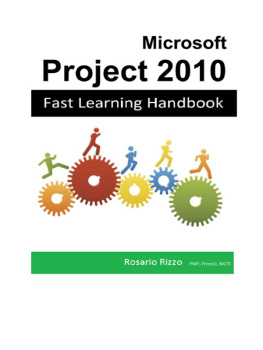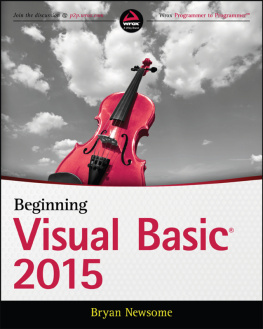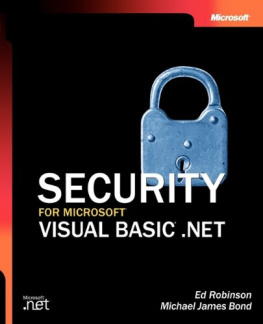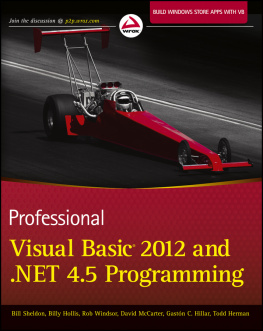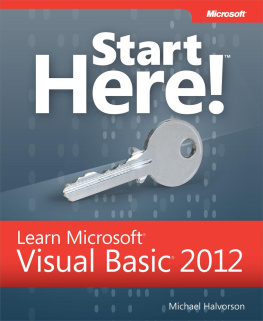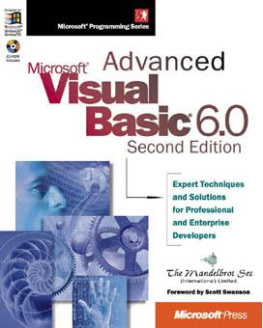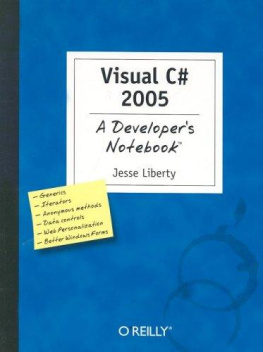Klaus Löffelmann - Microsoft® Visual Basic® 2010 Developers Handbook
Here you can read online Klaus Löffelmann - Microsoft® Visual Basic® 2010 Developers Handbook full text of the book (entire story) in english for free. Download pdf and epub, get meaning, cover and reviews about this ebook. year: 2011, publisher: OReilly Media - A, genre: Computer. Description of the work, (preface) as well as reviews are available. Best literature library LitArk.com created for fans of good reading and offers a wide selection of genres:
Romance novel
Science fiction
Adventure
Detective
Science
History
Home and family
Prose
Art
Politics
Computer
Non-fiction
Religion
Business
Children
Humor
Choose a favorite category and find really read worthwhile books. Enjoy immersion in the world of imagination, feel the emotions of the characters or learn something new for yourself, make an fascinating discovery.

- Book:Microsoft® Visual Basic® 2010 Developers Handbook
- Author:
- Publisher:OReilly Media - A
- Genre:
- Year:2011
- Rating:3 / 5
- Favourites:Add to favourites
- Your mark:
- 60
- 1
- 2
- 3
- 4
- 5
Microsoft® Visual Basic® 2010 Developers Handbook: summary, description and annotation
We offer to read an annotation, description, summary or preface (depends on what the author of the book "Microsoft® Visual Basic® 2010 Developers Handbook" wrote himself). If you haven't found the necessary information about the book — write in the comments, we will try to find it.
Microsoft® Visual Basic® 2010 Developers Handbook — read online for free the complete book (whole text) full work
Below is the text of the book, divided by pages. System saving the place of the last page read, allows you to conveniently read the book "Microsoft® Visual Basic® 2010 Developers Handbook" online for free, without having to search again every time where you left off. Put a bookmark, and you can go to the page where you finished reading at any time.
Font size:
Interval:
Bookmark:
Copyright 2011
Authorized English translation of the German edition of Microsoft Visual Basic 2010 - Das Entwicklerbuch: Grundlagen, Techniken, Profi-Know-how 2010 Klaus Loffelmann and Sarika Calla Purohit.
All rights reserved. No part of the contents of this book may be reproduced or transmitted in any form or by any means without the written permission of the publisher.
1 2 3 4 5 6 7 8 9 TG 6 5 4 3 2 1
Microsoft Press books are available through booksellers and distributors worldwide. If you need support related to this book, email Microsoft Press Book Support at .
Microsoft and the trademarks listed at http://www.microsoft.com/about/legal/en/us/IntellectualProperty/Trademarks/EN-US.aspx are trademarks of the Microsoft group of companies. All other marks are property of their respective owners.
The example companies, organizations, products, domain names, email addresses, logos, people, places, and events depicted herein are fictitious. No association with any real company, organization, product, domain name, email address, logo, person, place, or event is intended or should be inferred.
This book expresses the authors views and opinions. The information contained in this book is provided without any express, statutory, or implied warranties. Neither the authors, OReilly Media, Inc., Microsoft Corporation, nor its resellers, or distributors will be held liable for any damages caused or alleged to be caused either directly or indirectly by this book.
Acquisitions and Developmental Editor: Russell Jones
Production Editor: Kristen Borg
Production Services: Octal Publishing Services.
Technical Reviewer: Evangelos Petroutsos
Copyeditor: Bob Russell
Indexer: Lucie Haskins
Cover Design: Twist Creative Seattle
Cover Composition: Karen Montgomery
To Adriana, in love. Thanks for always letting me be myself, and taking me the way I am. |
| -- Klaus |
Visual Studio 2010 is an exciting version for the Visual Basic language, which reaches a double digit version in Visual Basic 10. This is a phenomenal achievement for a programming language, and it demonstrates the enormous utility that the language continues to provide, year after year. Visual Basic has always been a premier tool for making Microsoft platforms accessible and easy to use. And even though the specific technologies and devices have changed over time, the core mission of Visual Basic has remained the same. Starting in 1991 with Visual Basic 1 and continuing through to Visual Basic 3, Visual Basic revolutionized Windows application development by making it accessible in a way that simply wasnt possible before its arrival. Moving forward to Visual Basic 4 through Visual Basic 6, the language greatly simplified component programming with the Component Object Model (COM), Object Linking and Embedding (OLE) automation, and ActiveX controls. Finally, with Visual Basic 7 and beyond, the language has enabled developers to take advantage of the Common Language Runtime (CLR) and many .NET Framework technologies. This book covers examples of this, using Visual Basic to access .NET Framework data types, Language Integrated Query (LINQ), Windows Presentation Foundation (WPF), and the Task Parallel Library. LINQ in particular has had a significant impact on the language, providing a unified way to access data from objects, XML, or relational data sources. One of the most revolutionary features introduced as part of LINQ is XML literals, which makes Visual Basic the most productive language for programming with XML.
Looking ahead, there are three major development trends that we see influencing the Visual Basic language, now and in the future: declarative, dynamic, and concurrent programming.
Declarative programming lets developers state what the program should do, rather than requiring them to specify in great detail how the compiler should do it. This has always been a design principle for Visual Basic, in which we strive to increase the expressiveness of the language so that you can say more with less code. Some recent examples of this in Visual Basic 9 are LINQ and type inference. Visual Basic 10 introduces similar efficiencies with multi-line lambdas, array literals, collection initializers, autoimplemented properties, and implicit line continuationall of which are covered in this book.
Dynamic programming is another style that has influenced the design of Visual Basic. Late binding is an important feature that has made Visual Basic a great language for Microsoft Office development and COM programming. In Visual Basic 10, we extended Visual Basics late-binding support to work with other dynamic type environments, such as JavaScript and IronPython. This was made possible by the Dynamic Language Runtime (DLR), which was introduced in .NET Framework 4.
Finally, concurrency is an undeniable trend that we see influencing many forms of development. Whether your application is running on a multicore machine, a clustered environment on premises, via distributed computing in the Cloud, or even on a single-core computer performing IO-bound operations, concurrency can help speed up its execution..NET Framework 4 provides some great tools for concurrent programming, such as the Task Parallel Library and Parallel LINQ. of this book shows how to use these technologies in Visual Basic.
Visual Basic is a vibrant environment, and we invite you to dive into it in Visual Studio 2010. Whether youve used previous versions of Visual Basic or other object-oriented programming (OOP) languages, or you are new to OOP altogether, this book has the information you need to quickly become productive. It explains programming concepts, Visual Basic, Visual Studio, and the .NET Framework from the bottom up, and it establishes a strong foundation. For the more experienced reader, this book also goes deeply into these topics and includes dedicated sections on whats new in the 2010 release of Visual Studio. The book covers a variety of topics; some of them are technology-specific (such as WPF), while others are application agnostic (such as garbage collection and serialization). This book establishes a solid foundation that you can leverage when developing applications for any platform that Visual Studio 2010 targets, including Microsoft SharePoint, the Web, and the Cloud.
As Visual Studio Community Program Manager, I always enjoy meeting members of the Visual Studio community. One of the first times Klaus wrote to me, he quoted a motto he had learned from his grandmother: the worst attempt is the one that youll never make. I knew at that point that he was an ambitious person! Klaus has been writing computer books for more than 20 years. The subjects of those books include, Commodore 16, Commodore 64, Commodore 128, Atari ST, Amiga, Visual Basic 1, Visual Basic 3, Visual Basic 4, Visual Basic 5, Visual Basic 6, Visual Studio 2003, Visual Studio 2005, Visual Studio 2008, and now Visual Studio 2010. Ive met with Klaus in various cities around the world: Antwerp, Berlin, and Seattle. His first trip to Seattle was for the Microsoft Most Valuable Professional (MVP) Summit. The MVP program honors Microsoft technology experts for their impact in the community, and Klaus was recognized as a Visual Basic MVP for the great support hes provided through writing books, delivering webcasts, and reviewing German content on MSDN. Klaus made his second trip to Seattle while writing this book. He found great inspiration in being at the place where the magic happens. I took Klaus on a tour through the Microsoft offices, where he was able to connect with other members of the Visual Basic product team. It was a really exciting visit and I could see how passionate Klaus is about Visual Basic.
Font size:
Interval:
Bookmark:
Similar books «Microsoft® Visual Basic® 2010 Developers Handbook»
Look at similar books to Microsoft® Visual Basic® 2010 Developers Handbook. We have selected literature similar in name and meaning in the hope of providing readers with more options to find new, interesting, not yet read works.
Discussion, reviews of the book Microsoft® Visual Basic® 2010 Developers Handbook and just readers' own opinions. Leave your comments, write what you think about the work, its meaning or the main characters. Specify what exactly you liked and what you didn't like, and why you think so.

